Bloodied, bruised and battered, the two boxers have just completed a brutal bout in the ring in Berlin’s Mitte district and remove their gloves to face their next challenge: a round of speed chess.
Welcome to the bizarre world of chess boxing, developed in inner-city Berlin and featuring alternate rounds of chess and boxing in a fierce combination of brains and brawn.
Inspired by a science fiction book, the sport that emerged initially as an urban art event has grown into one enjoyed by many across three continents.
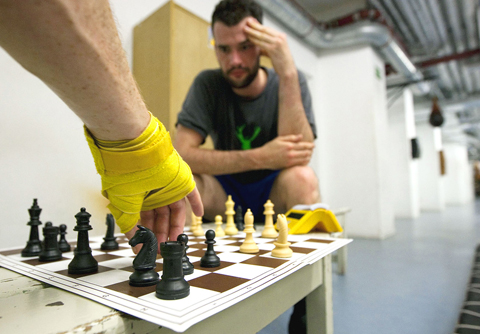
PHOTO: REUTERS
Boxers play six rounds of chess alternating with five of boxing as they put their physical and mental skills to the test.
Chess rounds last a total of four minutes, with the players wearing headphones to block out cheers, coaches’ advice and the commentator’s voice.
“This is all about discipline and control of your body and your mind,” said the sport’s founder, Iepe Rubingh, a Dutchman who set up the first club in Berlin.
Rubingh, a chess-playing artist, took up boxing in his 20s. It was around that time that he stumbled across the work of graphic artist Enki Bilal, whose novel Froid Equateur first featured the sport.
“I started quite late with boxing training. I thought about this sport and said: ‘This cannot be done. You cannot play chess after a round of boxing. You are just not capable, your body will not allow you,’” Rubingh said.
With huge amounts of adrenalin pumped into the body during the fight, a heart rate of 170 and more oxygen in the muscles than in the brain, chess boxers’ limits are really tested when they take off their gloves and sit down, sweaty and out of breath, at the chess board.
“When you sit down to play chess after your boxing round then you look at the board as if it is the first time you see it,” Rubingh said. “It is a bit like biathlon, with the skiing and shooting.”
“Adrenalin is massive, making it difficult to think straight, and it also makes you fearless and that is the biggest mistake you can make on the chess board at that time. You have to train hard for this changeover,” he said.
Chess boxers have little in common with the stereotype of a prize fighter, or a chess player for that matter. Many of them are 30 or older and are in top physical condition, with a high IQ and a rating under the Elo system used by the World Chess Federation (FIDE).
Berlin police officer Frank Stoldt is one of them. Long a kickboxer, the 40-year-old Stoldt, who has an Elo chess rating of 2,000, joined the Berlin chess boxing club the moment he heard about it.
“I thought they had invented the sport for me,” said Stoldt, interrupting a round of speed chess in a small training room in the Berlin gym.
“It is a unique sport, combining two seemingly opposite things. But it has huge potential. It is this testing of the human body and mind that makes it so exciting,” said Stoldt, a former chess boxing world champion, before taking up his skipping rope for a cardiovascular workout.
Some have called chess boxers the ultimate fighters, excelling in both physical and mental bouts. Winners in each of the four weight categories can be declared by a knockout or a checkmate, or when playing time runs out.
The sport has grown beyond Germany to Russia, the US, England and Australia. So far, only men’s competitions have been organized, but a small number of women are now training at chess boxing clubs.
Losing its main sponsor amid the economic crisis has done little to dampen the sport’s expansion plans, it seems. A European championship fight in England next month will be followed by the world championship in Russia’s Siberian city of Krasnoyarsk.
“Grass-roots level development is what we are doing right now and we can do that easily,” Rubingh said. “We do not need to organize a congress for 100 people like other federations.”
“We just need a group on Facebook,” Rubingh said during a tour of the visiting athletes’ Berlin accommodation, where the rooms were covered with wallpaper showing chess boxing scenes and sprinkled with quotes from famous boxers and chess players.
“Russia is the chess boxing nation and it is now waking up,” Rubingh said.
Eastern Europe, and Russia in particular, have proved to be fertile ground for the sport, with both boxing and chess widely played.
One of Rubingh’s plans is to stage an unofficial demonstration of chess boxing during the 2012 London Olympics.
“We are planning some guerrilla shows in London during the Games,” said Rubingh, who as an artist has blocked off roads in Tokyo and Berlin, causing traffic chaos.
“Our vision is to one day make it to the Olympics. I think there it would become the top discipline for the ultimate athlete,” he said.
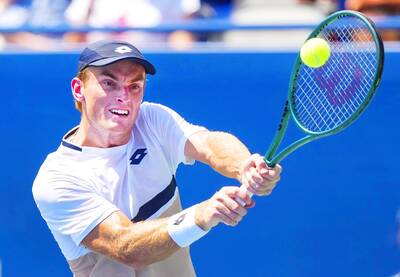
TAIWANESE EXITS: Fellow Australian Christopher O’Connell joined Tristan Schoolkate as a winner following his 6-1, 6-2 defeat of Tseng Hsin-chun Australian qualifier Tristan Schoolkate on Monday dispatched rising Brazilian talent Joao Fonseca 7-6 (7/5), 6-4 at the ATP Toronto Masters, ensuring a breakthrough into the world top 100. The 24-year-old from Perth moved to 98th in the ongoing live rankings as he claimed his biggest career victory by knocking out the ATP NextGen champion from November last year. Schoolkate, son of a tennis coach, won his first match over a top-50 opponent on his sixth attempt as he ousted the world No. 49 teenager from Brazil. The qualifier played a quarter-final this month in Los Cabos and won through qualifying for his
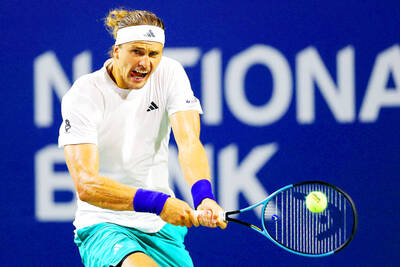
Top seeds Alexander Zverev of Germany and American Coco Gauff on Tuesday advanced to the third round of the Canadian Open after both players were pushed hard by their opponents. World No. 3 Zverev, playing in his first match since his first-round loss at Wimbledon, was far from his best, but emerged with a 7-6 (8/6), 6-4 win over Adam Walton under the lights in Toronto. Momentum shifted firmly in Zverev’s favor when he won a 52-shot rally in the first set tiebreak and he sealed the win on a double fault by the Australian in the second set. “It was a very
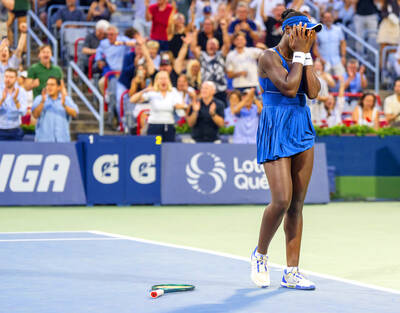
Canadian teenager Victoria Mboko upset top-seeded Coco Gauff 6-1, 6-4 on Saturday night to reach the National Bank Open quarter-finals. “Your support was incredible,” Mboko told the crowd in French after a chorus of “Ole, Ole, Ole” chants echoed around the venue. “I’m really happy to win today ... It’s incredible. I’m so happy to beat such a great champion.” Gauff dropped to 2-3 since winning the French Open. She followed the major victory with opening losses in Berlin and Wimbledon, then overcame double-fault problems to win two three-set matches in Montreal. Gauff had five double-faults on Saturday after having 23 in
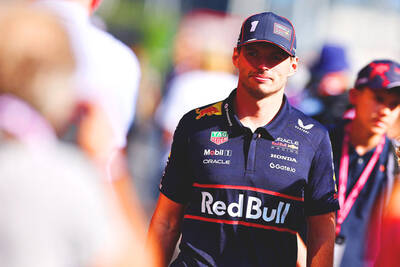
Formula 1 champion Max Verstappen on Thursday said that he is staying with the Red Bull team next year, ending months of speculation over his future. “Some people just like to stir the pot, some people just like to create drama, but, for me, it’s always been quite clear, and also for next year,” the four-time champion said ahead of the Hungarian Grand Prix. “I’m discussing with the team already the plans — the things that we want to change for next year, so that means that I’m also staying with the team for next year,” he said. Verstappen has a contract with